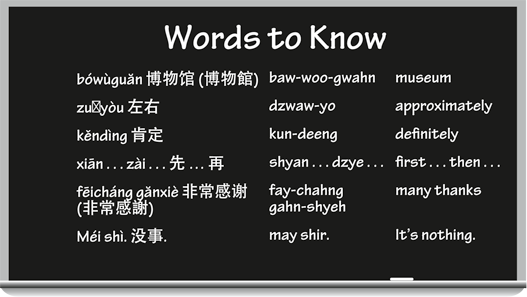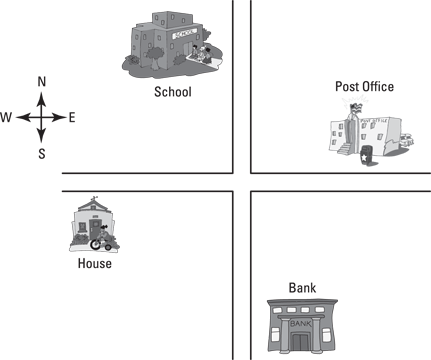Chinese For Dummies (122 page)
Read Chinese For Dummies Online
Authors: Wendy Abraham

 xī nán
xī nán
西å
(she nahn) (
southwest
)
 When it comes to indicating north, south, east, and west (as well as left and right), you can use either
When it comes to indicating north, south, east, and west (as well as left and right), you can use either
-biÄn
è¾¹
(
é
) (byan) or
-mià n
é¢
(myan) as a word ending, but not
-tóu
头
(
é
) (to), which you can use with other position words such as front, back, inside, and outside. (I cover these position words earlier in the chapter.)
 Giving directions often entails multiple instructions. “Make a right, and you're there.” or “Go straight, and you'll see it right in front of you.” doesn't always cut it. Luckily, a common Chinese pattern makes giving multiple directions easy:
Giving directions often entails multiple instructions. “Make a right, and you're there.” or “Go straight, and you'll see it right in front of you.” doesn't always cut it. Luckily, a common Chinese pattern makes giving multiple directions easy:
xiÄn
å
+ Verb 1,
zà i
å
+ Verb 2. (shyan + Verb 1, dzye + Verb 2.) (
First do Verb 1, and then do Verb 2.
)
Here are some examples:
XiÄn wà ng dÅng zÇu, zà i wà ng yòu zhuÇn.
å
å¾ä¸èµ°
,
åå¾å³è½¬
. (
å
å¾æ±èµ°
,
åå¾å³è½
.) (shyan wahng doong dzoe, dzye wahng yo jwan.) (
First walk east, and then turn right.
)
XiÄn zhà zÇu, zà i wà ng xÄ« zÇu.
å
ç´èµ°
,
åå¾è¥¿èµ°
. (shyan jir dzoe, dzye wahng she dzoe.)
(
First go straight, and then turn west.
)
Talkin' the Talk
Linda is walking around Shanghai looking for the Shanghai Museum. She begins to wonder if she's going in the right direction, so she decides to ask a stranger how to get there.
Linda:
QÇngwèn, Shà nghÇi bówùguÇn là zhèr hÄn yuÇn ma?
cheeng-one, shahng-hi baw-woo-gwahn lee jar hun ywan mah?
Excuse me, is the Shanghai Museum very far from here?
Stranger:
Bù yuÇn. Shà nghÇi bówùguÇn jiù zà i rénmÃn dà dà o.
boo ywan. shahng-hi baw-woo-gwahn jyo dzye run-meen dah daow.
It's not far at all. The Shanghai Museum is on the Avenue of the People.
Linda:
RénmÃn dà dà o là zhèr duÅme yuÇn?
run-meen dah daow lee jar dwaw-muh ywan?
How far is the Avenue of the People from here?
Stranger:
RénmÃn dà dà o là zhèr zhÇ yÇu yì lÇ lù zuÇyòu.
run-meen dah daow lee jar jir yo ee lee loo dzwaw-yo.
The Avenue of the People is only about one kilometer from here.
Linda:
Cóng zhèr zÇu de dà o, zÇu bú dà o?
tsoong jar dzoe duh daow, dzoe boo daow?
Can I walk there from here?
Stranger:
KÄndìng zÇu de dà o. NÇ xiÄn wà ng nán zÇu, zà i dì èr tiáo lù wà ng xÄ« zhuÇn. Dì yÄ« ge lóu jiù shì.
kun-deeng dzoe duh daow. nee shyan wahng nahn dzoe, dzye dee are tyaow loo wahng she jwan. dee ee guh low jyoe shir.
It's certainly walkable. First walk north, and then turn west at the second street. It'll be the first building you see.
Linda:
FÄicháng gÇnxiè nÇ.
fay-chahng gahn-shyeh nee.
I'm extremely grateful [for your help].
Stranger:
Méi shì.
may shir.
It's nothing.

 Â Fun & Games
 Fun & Games
Use Chinese cardinal directions to indicate whether each building in the illustration is to the north, south, east, or west. (Check out
Appendix D
for the answers.)

A. School: ____________________________________________
B. Post office: ________________________________________
C. Bank: ______________________________________________
D. House: ______________________________________________
Chapter 18
Finding a Place to Stay
In This Chapter
 Booking your room reservation
Booking your room reservation
 Checking in upon arrival
Checking in upon arrival
 Requesting hotel service
Requesting hotel service
 Paying your bill
Paying your bill
T
he right hotel can make or break a vacation. Whether you stay in a capital city or a little backwater town with only one hotel to its name, you still need to know how to check in, check out, and ask for anything you need in between (including the bill). This chapter runs you through the gamut of booking your hotel, checking in at the front desk, checking out at the designated time, and dealing with all sorts of issues that may come up in between.
 First, however, I have an astounding fact for you: You have not one, not two, but as many as five ways to say the word
First, however, I have an astounding fact for you: You have not one, not two, but as many as five ways to say the word
hotel
in Chinese:
 bÄ«nguÇn
bÄ«nguÇn
宾é¦
(
宾é¦
)
(been-gwahn) (Literally:
a place for guests
)
 fà ndià n
fà ndià n
é¥åº
(
飯åº
) (fahn-dyan) (Literally:
a place for meals
)
 jiÇdià n
jiÇdià n
é
åº
(jyo-dyan) (Literally:
a place for wine
)
 lÇguÇn
lÇguÇn
æ
é¦
(
æ
館
) (lyew-gwahn) (
hotel
)
 zhÄodà isuÇ
zhÄodà isuÇ
æå¾
æ
(jaow-dye-swaw) (Literally:
a place to receive people
)
Making a Room Reservation
Thinking of
yùdìng
é¢å®
(
é å®
)
(yew-deeng) (
reserving
) a hotel
fángjiÄn
æ¿é´
(
æ¿é
) (fahng-jyan) (
room
)? What kind do you want? A single room all for yourself? A double room for you and your special someone? Or perhaps a suite for a special occasion like your
50th wedding anniversary?
You have many kinds of rooms to choose from, depending on your budget and your unique needs:
 dÄnrén fángjiÄn
dÄnrén fángjiÄn
å人æ¿é´
(
å®äººæ¿é
) (dahn-run fahng-jyan) (
single room
)
 shuÄngrén fángjiÄn
shuÄngrén fángjiÄn
å人æ¿é´
(
é人æ¿é
) (shwahng-run fahng-jyan) (
double room
)